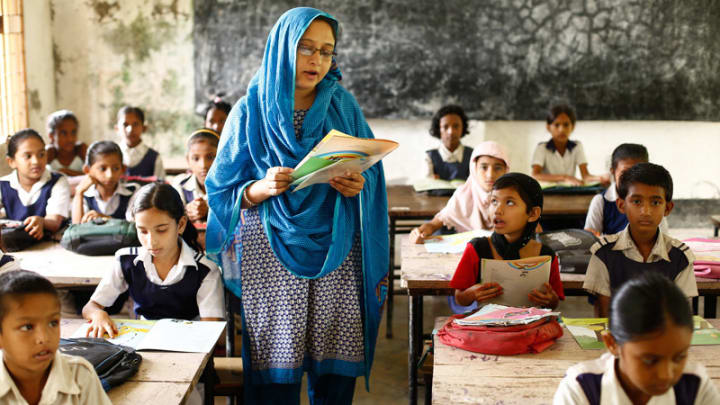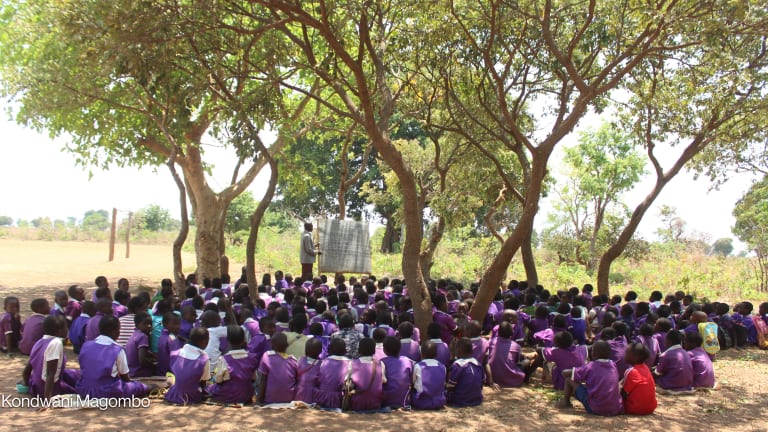
LONDON — Governments need to stop blaming teachers for failing education systems and strengthen country-led accountability mechanisms to drive progress toward the Sustainable Development Goals for education, according to a new report from the United Nations Educational, Scientific and Cultural Organization.
At the same time, governments must be aware that some accountability instruments, including payment-by-results measures, can have negative impacts on education systems, the authors warned.
The report — “Accountability in education: meeting our commitments” — published Tuesday and is the second Global Education Monitoring report from the U.N. agency responsible for measuring global progress on SDG 4 — delivering inclusive and equitable quality education for all.
An estimated 260 million children and young people are not enrolled in school worldwide, and experts warn that those in the classroom may not be learning much.
The challenge is exacerbated since, in many developing countries, national governments are failing to meet the total public expenditure target of 20 percent recommended by the Education 2030 Framework for Action. The percentage of donor funding going to education has also declined for the past six years, falling from 10 percent in 2009 to 6.9 percent in 2015.
The UNESCO report, launched at an event hosted by the Overseas Development Institute in London, United Kingdom, focuses on stronger accountability for education in developing countries — requiring actors to report on their education responsibilities as outlined in the SDGs — but says these efforts must be led by government.
“Accountability must start with governments. If a government is too quick to apportion blame to others, it is deflecting attention away from its own responsibility for creating a strong, supportive education system,” Manos Antoninis, director of the Global Education Monitoring report, said in a press release.
Susan Nicolai, senior research fellow at the Overseas Development Institute, said that while accountability is central to delivering on SDG 4, it is also complicated.
“My big takeaway is the complexity … There are a lot of questions and a lot of challenges as one looks at implementing and addressing accountability in different education systems,” she said, adding that many other actors need to be involved alongside central government to “make accountability work right.” That includes working with local government officials. She added that other layers of accountability — including laws and regulations — complicate the picture depending on the context.
Without a broader accountability system being in place, she said, the result can be just “finger pointing.”
Don’t blame the teachers
While teachers do need to be held accountable, they are often disproportionately and unfairly blamed for poor learning levels, according to the report. High teacher absenteeism rates are a problem in developing countries — the average rate was 19 percent, according to a 2012 six-country study in Africa — but in many cases this is due to school management issues rather than teacher choice.
For example, in Senegal, schools were closed for 50 out of 188 official school days, making it impossible for staff to attend; and in Indonesia, nearly half of absences were down to teachers being granted study leave without replacements being arranged.
The report also found that governments are increasingly judging, and sanctioning, teachers and schools based on narrow performance measures such as test results. This practice can have negative side effects, the authors state.
“Using student test scores to sanction teachers and schools makes it more likely they will adjust their behavior to protect themselves, which may mean leaving the weakest learners behind,” Antoninis said.
The increasing use of performance-related teacher payment programs has also been linked to limited “teaching to the test” practices, and can create a competitive environment that reduces motivation, especially among female teachers, according to the report.
What governments can do
Speaking at the launch event, William Smith, a senior policy analyst with the Global Education Monitoring report, outlined three key ways that governments can help strengthen accountability in the education sector: increasing transparency; committing adequate financing to education; and building strong institutions in order to detect and deter corruption.
However, on the financing side, Smith again warned that governments and donors should think twice about using results-based financing programs to improve education outcomes, since they can “decrease the intrinsic motivation of providers and undermine country ownership.”
Smith also said that, while transparency is important, governments must ensure information provided by authorities allows for feedback and does not overload parents, citing a study from Kenya that showed that more than 70 percent of parents said they did not know what to do with the student learning data they had been given.
Read more international development news online, and subscribe to The Development Newswire to receive the latest from the world’s leading donors and decision-makers — emailed to you free every business day.
Read more related stories:
► In Cambodia, a bold teaching program draws on international models and local context
► Funding struggle: Can Liberia's controversial privately-run schools pilot continue?
► What it takes to educate South Sudan's 'forgotten' communities
► 3 tips to design education programs for roving and displaced communities




